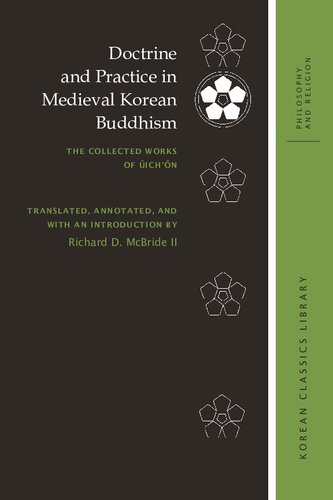

Most ebook files are in PDF format, so you can easily read them using various software such as Foxit Reader or directly on the Google Chrome browser.
Some ebook files are released by publishers in other formats such as .awz, .mobi, .epub, .fb2, etc. You may need to install specific software to read these formats on mobile/PC, such as Calibre.
Please read the tutorial at this link: https://ebookbell.com/faq
We offer FREE conversion to the popular formats you request; however, this may take some time. Therefore, right after payment, please email us, and we will try to provide the service as quickly as possible.
For some exceptional file formats or broken links (if any), please refrain from opening any disputes. Instead, email us first, and we will try to assist within a maximum of 6 hours.
EbookBell Team

4.1
90 reviewsŬich’ŏn (1055-1101) is recognized as a Buddhist master of great stature in the East Asian tradition. Born a prince in the medieval Korean state of Koryŏ (960-1279), he traveled to Song China (960-1279) to study Buddhism and later compiled and published the first collection of East Asian exegetical texts. According to the received scholarly tradition, after returning to Korea, Ŭich’ŏn left the Hwaŏm (Huayan) school to found a new Ch’ŏnt’ae (Tiantai) school when he realized that the synthesis between doctrinal learning and meditative practice in the latter would help bring together the discordant sects of Koryŏ Buddhism. In the late twentieth century, however, scholars began to question the assertion that Ŭich’ŏn forsook one school for another, arguing that his writings assembled inThe Collected Works of State Preceptor Taegak (Taegak kuksa munjip)do not portray a committed sectarian but a monk dedicated to developing a sophisticated and rigorous system of monastic education that encompassed all Buddhist intellectual traditions.
In this first comprehensive study of Ŭich’ŏn’s life and work in English, Richard McBride presents translations of select lectures, letters, essays, and poetry fromThe Collected Worksto provide a more balanced view of Ŭich’ŏn’s philosophy of life and understanding of key Buddhist teachings. The translations center on the monk’s activities in the pan-East Asian Buddhist world and his compilation of scholarly texts, writings related to his interactions with royalty, and correspondence with his Chinese mentor, Jinshui Jingyuan (1011-1088). By incorporating Ŭich’ŏn’s work associated with doctrinal Buddhism and his poetry, McBride clearly shows that even in his most personal work Ŭich’ŏn did not abandon Hwaŏm teachings for those of the Ch’ŏnt’ae but rather he encouraged monks to blend the best learning from all doctrinal traditions with meditative practice.